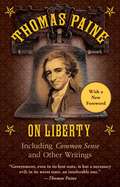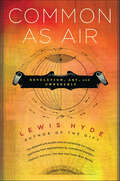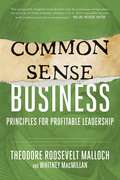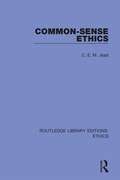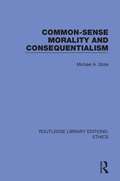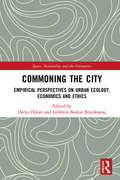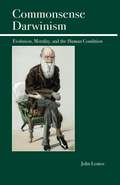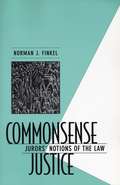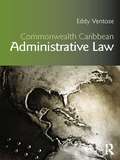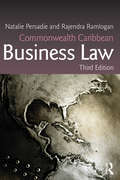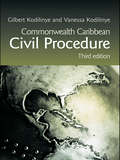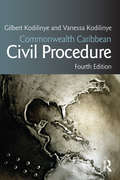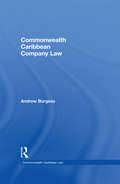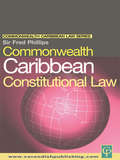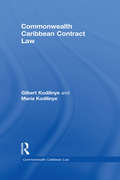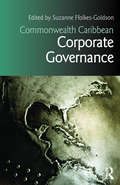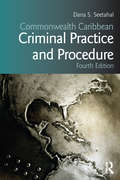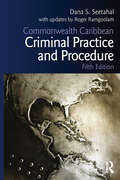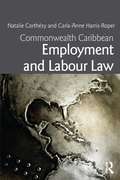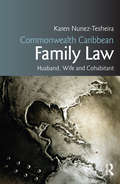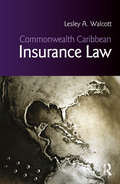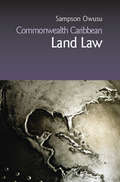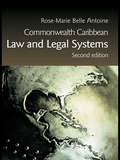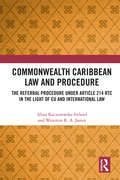- Table View
- List View
Common Sense: and Other Writings
by Thomas Paine Alan DershowitzThomas Paine is most famous for writing Common Sense, a pamphlet distributed during the American Revolution advocating for colonial America's independence from Great Britain. Now, collected here in a beautiful gift book volume, are excerpts from this important historical American document, as well as several of his other writings. This volume is introduced by Alan Dershowitz, Professor of Law, Emeritus at Harvard Law School and a noted civil liberties advocate. Paine believed in more than just freedom in the form of revolution and overthrowing governments. He also believed in freedom from oppressive and organized religions and monopolies. Included in this book are passages taken from The Age of Reason and The Rights of Man, as well as letters to George Washington, Benjamin Rush, and Samuel Adams, and pamphlets such as "The American Crisis" and "Agrarian Justice." Throughout his writings, Paine provides excellent and timeless wisdom on attaining liberty and living a democratic life.
Common Values
by Sissela BokIn this book, Sissela Bok asks what moral values, if any, might be capable of being shared across national, ethnic, religious, and other boundaries, under what circumstances, and with what qualifications. As the twentieth century draws to a close, societies confront challenges and threats - whether from environmental or military or from epidemics such as cholera or AIDS - that cross every boundary. Responses, to be effective, must be collective as well; yet they cannot begin to be effective, Bok suggests, without greater stress on common values and goals.
Common as Air: Revolution, Art, and Ownership
by Lewis HydeCommon as Air offers a stirring defense of our cultural commons, that vast store of art and ideas we have inherited from the past that continues to enrich our present. Suspicious of the current idea that all creative work is "intellectual property," Lewis Hyde turns to America's founding fathers—men like John Adams, James Madison, and Thomas Jefferson—in search of other ways to value the fruits of human wit and imagination. What he discovers is a rich tradition in which knowledge was assumed to be a commonwealth, not a private preserve.For the founding fathers, democratic self-governance itself demanded open and easy access to ideas. So did the growth of creative communities, such as that of eighteenth-century science. And so did the flourishing of public persons, the very actors whose "civic virtue" brought the nation into being.In this lively, carefully argued, and well-documented book, Hyde brings the past to bear on present matters, shedding fresh light on everything from the Human Genome Project to Bob Dylan's musical roots. Common as Air allows us to stand on the shoulders of America's revolutionary giants and to see beyond today's narrow debates over cultural ownership. What it reveals is nothing less than an inspiring vision of how to reclaim the commonwealth of art and ideas that we were meant to inherit.
Common-Sense Business: Principles for Profitable Leadership
by Theodore Roosevelt Malloch Whitney MacMillan“Has the potential to transform how all companies are run…Nothing could be more valuable!”—Mark Drewell, CEO, Globally Responsible Leadership Initiative (GRLI) From two of the world’s most successful business leaders comes Common-Sense Business—an accessible, actionable guide to better leadership, increased profits, and a more sustainable economic model predicated on prudence and socially conscious business. Common sense and prudence have long been among the guiding tenets of society, but in today’s economy they have been completely abandoned in the interest of blindly maximizing profits. Common-Sense Business shows that this current economic model is both detrimental and unsustainable, and that we must transform the global economy along the lines of common sense toward the common good. Ted Malloch, a thought leader and policy influencer in global economic strategy, and Whitney MacMillan, the former chairman and CEO of the world’s largest private corporation, draw on recent research, history’s greatest minds, and their own successes to explain that ethically driven business is both a moral and financial necessity. Inspired by Thomas Paine’s Common Sense, this work explains to readers in all walks of life that ethically driven business will lead to better long-term profits, larger customer bases and more positive customer relations, and a holistically improved business. This book is a must-read for business owners, entrepreneurs, students, and businessmen and women in all sectors of the economy.
Common-Sense Ethics
by C. E. JoadOriginally published in 1921, this book makes philosophical ethics accessible to the non-philosopher and applies them to problems of everyday life. The author maintains that morality is the rationalization of the impulse to blame and emphases the importance of impulses. He illustrates how modern society conspires to suppress impulses and restrict their operation.
Common-Sense Morality and Consequentialism
by Michael A. SloteOriginally published in 1985 and now re-issued with a new preface, this study assesses the two major moral theories of ethical consequentialism and common-sense morality by means of mutual comparison and an attempt to elicit the implications and tendencies of each theory individually. The author shows that criticisms and defences of common-sense morality and of consequentialism give inadequate characterizations of the dispute between them and thus at best provide incomplete rationales for either of these influential moral views. Both theories face inherent difficulties, some familiar but others mentioned for the first time in this work. The argument proceeds by reference to historical figures like Bentham, Ross and Sidgwick and to contemporary thinkers such as Williams, Nagel, Hare and Sen.
Commoning the City: Empirical Perspectives on Urban Ecology, Economics and Ethics
by Derya Özkan Güldem Baykal BüyüksaraçThis collection seeks to expand the limits of current debates about urban commoning practices that imply a radical will to establish collaborative and solidarity networks based on anti-capitalist principles of economics, ecology and ethics. The chapters in this volume draw on case studies in a diversity of urban contexts, ranging from Detroit, USA to Kyrenia, Cyprus – on urban gardening and land stewardship, collaborative housing experiments, alternative food networks, claims to urban leisure space, migrants’ appropriation of urban space and workers’ cooperatives/collectives. The analysis pursued by the eleven chapters opens new fields of research in front of us: the entanglements of racial capitalism with enclosures and of black geographies with the commons, the critical history of settler colonialism and indigenous commons, law as a force of enclosure and as a strategy of commoning, housing commons from the urban scale perspective, solidarity economies as labour commons, territoriality in the urban commons, the non-territoriality of mobile commons, the new materialist and post-humanist critique of the commons debate and feminist ethics of care.
Commonsense Darwinism: Evolution, Morality, And The Human Condition
by John LemosWritten in a simple, accessible style, Commonsense Darwinism offers a clear, critical examination of the subject. Assuming that the diversity of life, including human beings, is the result of evolution from common origins and that its driving force is natural selection, the book explores what this might mean for issues in ethics, philosophy of religion, epistemology, and metaphysics. The author’s defense of free will makes this an especially stimulating read.
Commonsense Justice: Jurors' Notions of the Law
by Norman J. FinkelFor the first time in our history, U.S. prisons house over a million inmates, enough to populate a city larger than San Francisco. Building prisons is the new growth industry, as the American public reacts to a perceived increase in violence and politicians take a hard line toward crime. But this eagerness to construct more prisons raises basic questions about what the community wants and will tolerate and what the Supreme Court will sanction. In this timely book, Norman Finkel looks at the relationship between the "law on the books," as set down in the Constitution and developed in cases and decisions, and what he calls "commonsense justice," the ordinary citizen's notions of what is just and fair. Law is an essentially human endeavor, a collection of psychological theories about why people think, feel, and behave as they do, and when and why we should find some of them blameworthy and punishable. But is it independent of community sentiment, as some would contend? Or, as Finkel suggests, do juries bring the community's judgment to bear on the moral blameworthiness of the defendant? When jurors decide that the law is unfair, or the punishment inappropriate for a particular defendant, they have sometimes nullified the law. Nullification represents the jury's desire not to defeat but "to perfect and complete" the law. It is the "no confidence" vote of commonsense justice refusing to follow the path the law has marked out--and pointing to a new path based on what seem to be more just grounds. Finkel brings to life the story behind the jury and judicial decisions, interweaving anecdotes, case law, and social science research to present a balanced and comprehensive view of important legal and social policy issues.
Commonwealth Caribbean Administrative Law: Commonwealth Caribbean Administrative Law (Commonwealth Caribbean Law Ser.)
by Eddy VentoseCommonwealth Caribbean Administrative Law comprehensively explores the nature and function of administrative law in contemporary Caribbean society. It considers the administrative machinery of Caribbean States; Parliament, the Executive and the judiciary. It then examines the basis for judicial review of executive and administrative action in the Caribbean by looking at the statutory provisions that underpin this and the plethora of case law emerging from the region. The book will also look to how the courts in the Commonwealth Caribbean have sought to define principles of administrative law. This book will also consider the alternative methods by which the rights of citizens are protected, including the ombudsman and the use of tribunals and inquiries, as well as looking forward to the increasingly significant role of Caribbean Integration law and bodies such as CARICOM and the OESC.
Commonwealth Caribbean Business Law (Commonwealth Caribbean Law)
by Natalie Persadie Rajendra RamloganNow in its third edition, Commonwealth Caribbean Business Law continues to break away from the traditional English approach of treating business law primarily as the law of contract and agency. Taking a panoramic view, it explores the foundation of various legal systems before examining areas of legal liability that affect business activities. These include areas such as contract law, tort law, criminal law, agency and internet law which present significant challenges confronting the business sector. The book primarily targets the development of business law principles in several Caribbean Commonwealth jurisdictions but, where appropriate, also embraces the jurisprudence of other Commonwealth nations, such as the United Kingdom, Canada and Australia. It also explores the United States as a non-Commonwealth jurisdiction, given the increasing importance in the Caribbean of judicial pronouncements relating to internet law from this territory. Using excerpts from key judgments, the book allows students, particularly those with a non-legal background, to understand key legal principles for business as presented by the judiciary and draws parallels between legal theory and business practice.
Commonwealth Caribbean Civil Procedure
by Gilbert Kodilinye Vanessa KodilinyeThis new edition of a well-established book is a timely response to the enactment during the past 3 to 5 years of new rules of civil procedure which are now in force, or are soon coming into force in the vast majority of Caribbean jurisdictions. The third edition has been substantially revised and augmented to take into account the revision of the rules and covers the new rules in detail. The book also provides coverage of the recent case-law coming out of Jamaica and the Organisation of Eastern Caribbean States (OECS), under the new rules of civil procedure. This book is essential reading for students of Commonwealth Caribbean law as well as anyone wishing to get to grips with the new rules of civil procedure.
Commonwealth Caribbean Civil Procedure (Commonwealth Caribbean Law)
by Gilbert Kodilinye Vanessa KodilinyeThis new fourth edition of a well-established book is a timely response to the continuing development of the new rules of civil procedure in force in most of the jurisdictions of the English-speaking Caribbean. The new edition has been substantially revised to cover amendments to, and recent case law interpreting and applying, the Civil Procedure Rules of the various territories. It is essential reading for law students and legal practitioners in the region.
Commonwealth Caribbean Company Law (Commonwealth Caribbean Law)
by Andrew BurgessIn the last twenty five years, company law in the Commonwealth Caribbean has undergone dramatic changes, from a model influenced by English law to a new, harmonised collection of regional legislation based on the Caricom and CLI model Acts that vary substantially across Caricom member states. The variation within Caribbean company law presents an enormous challenge, both in terms of the breadth of the subject and in addressing the difference in provisions of one state’s Company Law Act as opposed to another. Using the Caricom model Act and CLI model Act as a basis for its structure, Commonwealth Caribbean Company Law examines and compares regional implementation of company law in an accessible and comprehensive manner that will be invaluable to students and practitioners in the region.
Commonwealth Caribbean Constitutional Law
by Fred PhillipsThis book includes the reforms proposed by the various Caribbean Commissions since 1985, making it a comprehensive guide to constitutional law in the Caribbean. It outlines sources of the law and developing changes in the doctrine of sovereignty of Parliament and the Conventions of the Constitution as well as in the role of the Public Service. There is also an expanded commentary on the Caribbean judiciary in which special reference is made to the proposed Caribbean Court of Justice.Caribbean Constitutional Law will be valuable to students of law and political science and practitioners wishing to renew their acquaintance with the basic concepts of constitutional law.
Commonwealth Caribbean Contract Law (Commonwealth Caribbean Law Ser.)
by Gilbert Kodilinye Maria KodilinyeThe first textbook on Commonwealth Caribbean Contract law for undergraduate and sixth form students, Commonwealth Caribbean Contract Law is a new and unrivalled resource on the subject. This textbook utilises Caribbean Case Law and Statutory provisions to provide a clear and immersive path into the study of contract law from a Caribbean perspective. Encompassing topics that include misrepresentation, privity, and remedies, this book expertly introduces and explains the many aspects of contract law in the Caribbean. Written by a well-established textbook author and professor of law at Mona Campus, the textbook comprehensively covers all key principles of contractual obligations studied by undergraduate students, and is relevant to practitioners in a modern and accessible way. An invaluable reference, this book is essential reading for those with an academic or professional interest in contract law.
Commonwealth Caribbean Corporate Governance (Commonwealth Caribbean Law)
by Suzanne Ffolkes-GoldsonCorporate governance initiatives have been developing at a rapid pace in the Commonwealth Caribbean through legislation, case law and codes. Commonwealth Caribbean Corporate Governance offers an overview of current practice and legal developments in corporate governance, highlighting the interpretation of the legislation through case law and the codes of corporate governance which have now been implemented. It also considers the challenges which emerging markets face in an attempt to adopt the corporate governance initiatives of developed markets. This text explores the emergence and development of corporate governance in the region from a range of angles, including the protection and empowerment of shareholders, the impact on government agencies, and the role and responsibilities of directors and officers in companies and in government agencies. Written by a panel of academics, legal practitioners and experts working in business, this book will be an invaluable resource for judges, lawyers, corporate executives and students of business, corporate law and corporate management.
Commonwealth Caribbean Criminal Practice and Procedure
by Dana S. SeetahalThe fourth edition of this best-selling book has been thoroughly revised to take into account recent developments in the law in criminal practice and procedure across the region. The only textbook that explores criminal practice and procedure as it relates to the Commonwealth Caribbean, the book clari?es the state law in each of 11 jurisdictions, at the same time making it clear when laws are the same or similar and highlighting where differences among jurisdictions occur. Both statute law and common law are examined in the relevant jurisdictions, which include Trinidad and Tobago, Guyana, Barbados, Jamaica and Grenada amongst others. The impact of statutory changes in the laws are analysed, as well as recent developments in the common law. Throughout the text the statutory law in the Commonwealth Caribbean is compared to similar English legislation, in the light of the analysis of such legislation in English case law. Commonwealth Caribbean Criminal Practice and Procedure is the recommended textbook for all profes- sional law schools in the Commonwealth Caribbean and is used at regional universities as a reference book for criminal justice students. In addition, as the only book that deals speci?cally with criminal practice and procedure in the regions, it has proved a valuable reference tool for legal practitioners, judicial officers and police officers.
Commonwealth Caribbean Criminal Practice and Procedure (Commonwealth Caribbean Law)
by Roger RamgoolamThe fifth edition of this best-selling book has been thoroughly revised to take into account recent developments in the law in criminal practice and procedure across the region. As the only textbook to explore criminal practice and procedure as it relates to the Commonwealth Caribbean, the book clarifies the state law in each of 11 jurisdictions, while at the same time making it clear when laws are the same or similar and highlighting where differences among jurisdictions occur. Both statute law and common law are examined in the relevant jurisdictions, which include Trinidad and Tobago, Guyana, Barbados, Jamaica and Grenada amongst others. The impact of statutory changes in the laws are analysed, as well as recent developments in the common law. Throughout the text the statutory law in the Commonwealth Caribbean is compared with similar English legislation, in light of the analysis of such legislation in English case law. This book is the recommended textbook for all professional law schools in the Commonwealth Caribbean and is used at regional universities as a reference book for criminal justice students. In addition, as the only book that deals specifically with criminal practice and procedure in the regions, it has proved a valuable reference tool for legal practitioners, judicial officers and police officers.
Commonwealth Caribbean Employment and Labour Law
by Natalie G.S. Corthésy Carla-Anne Harris-RoperThis new edition to the series will provide an up-to-date textbook covering a wide-range of employment and labour law issues which affect the Commonwealth Caribbean.Initially the book will embark on a comparative analysis of employment and labour law in Jamaica, Trinidad and Barbados, as a reference point for distinguishing the laws of other Commonwealth Caribbean jurisdictions. The book will continue to examine how the law operates within the legal systems of the Caribbean, taking into account the umbilical link to British jurisprudence and the persuasive precedent of other Commonwealth jurisdictions, and the impact this has had on the growth and development of the area. Commonwealth Caribbean Employment and Labour Law will be essential reading for students enrolled on Employment Law, Discrimination and Dismissal Law courses in the Caribbean.
Commonwealth Caribbean Family Law: Husband, Wife, and Cohabitant (Commonwealth Caribbean Law)
by Karen TesheiraThis important new text is the product of several years of research of the family law of fifteen Commonwealth Caribbean jurisdictions. It is the first and only legal text that comprehensively covers all the main substantive areas of spousal family law, including marriage, divorce, financial support, property rights and domestic violence. The rights of the statutory spouse in the jurisdictions of Barbados, Belize, Guyana, Jamaica, and Trinidad and Tobago are examined, thus addressing, on a jurisdictional basis, an important area of spousal family that is seldom covered in English family law texts. The book also covers the number and variations of divorce regimes applicable to the region – the matrimonial offence divorce model of Guyana and Montserrat, the English five fact model of Trinidad and Tobago, Dominica, Grenada, Anguilla, and St Vincent and the Grenadines, the hybrid model of Antigua and Barbuda, Belize and St Kitts and Nevis, and the no fault model of Jamaica and Barbados. This book will prove an indispensable resource for law students and legal academics, as well as for family law practitioners across the English-speaking Caribbean. Other professionals, including sociologists and social workers, will also find the book useful and informative.
Commonwealth Caribbean Insurance Law (Commonwealth Caribbean Law)
by Lesley A WalcottThis book sets out in a clear and concise manner the central principles of insurance law in the Caribbean, guiding students through the complexities of the subject. This book features, among several other key themes, extensive coverage of: insurance regulation; life insurance; property insurance; contract formation; intermediaries; the claims procedure; and analysis of the substantive laws of several jurisdictions. Commonwealth Caribbean Insurance Law is essential reading for LLB students in Caribbean universities, students in CAPE Law courses, and practitioners.
Commonwealth Caribbean Land Law (Commonwealth Caribbean Law Ser.)
by Sampson OwusuThe first textbook to address land law as it relates to the Commonwealth Caribbean, it encompasses all areas covered in an undergraduate course on the law of real property in the Caribbean.Primary and secondary source material on the law of property in the whole of the Commonwealth Caribbean is made easily and readily accessible to law students and legal practitioners. Statutory provisions from all States are discussed in relation to each topic and the similarities and differences are highlighted. Extensive discussion and analysis of the decisions of the courts in the region are also included alongside an in-depth analysis and critical discussion of English case law that is relevant to the Caribbean. The examination of whether or not English case law should be followed in the region is relevant and interesting to anyone studying or practising law in other Commonwealth jurisdictions. Essential reading for undergraduate law students in the Caribbean, this text will also prove useful to those studying for the certificate of proficiency in the practice of law in the Commonwealth Caribbean, while the footnote references to statutory provisions are an invaluable aid to any researcher of Caribbean land law.
Commonwealth Caribbean Law and Legal Systems
by Rose-Marie Belle AntoineFully updated and revised to fit in with the new laws and structure in the Commonwealth Caribbean law and legal systems, this new edition examines the institutions, structures and processes of the law in the Commonwealth Caribbean. The author explores: - the court system and the new Caribbean Court of Justice which replaces appeals to the Privy Council - the offshore financial legal sector - Caribbean customary law and the rights of indigenous peoples - the Constitutions of Commonwealth Caribbean jurisdictions and Human Rights - the impact of the historical continuum to the region's jurisprudence including the question of reparations - the complexities of judicial precedent for Caribbean peoples - international law as a source of law - alternative dispute mechanisms and the Ombudsman Effortlessy combining discussions of traditional subjects with those on more innovative subject areas, this book is an exciting exposition of Caribbean law and legal systems for those studying comparative law.
Commonwealth Caribbean Law and Procedure: The Referral Procedure under Article 214 RTC in the Light of EU and International Law
by Alina Kaczorowska-Ireland Westmin R. JamesCommonwealth Caribbean Law and Procedure: The Referral Procedure under Article 214 RTC in the Light of EU and International Law is about the referral procedure set out in Article 214 of the Revised Treaty of Chaguaramas (RTC), which Treaty established the Caribbean Community Single Market and Economy (CSME). Article 214 RTC bears clear parallels to Article 267 of the Treaty on the Functioning of the European Union (TFEU), the most important being that that both articles pursue the same objective, i.e. they seek to ensure that CSME law and EU law, respectively, are uniformly applied in all Member States. Although Article 214 RTC was inspired by, and modelled on, Article 267 TFEU, it is not its exact replica. The similarities and differences between Article 214 RTC and Article 267 TFEU are critically assessed in this book. Also, the book: Examines how Article 214 RTC operates in the Caribbean context, how it interacts with other provisions of the RTC, and how it fits into the various national legal systems of the Member States of the CSME. Explores possible reasons why, so far, national courts of the Member States of the CSME have not made any referrals to the Caribbean Court of Justice (CCJ). Puts Article 214 RTC in a comparative perspective; in particular, the book compares and contrasts it with Article 267 TFEU. Examines some of the aspects of Article 214 RTC in the light of public international law, bearing in mind that under Article 217(1) RTC, the CCJ is required, when exercising its original jurisdiction under Article 211 RTC, to "apply such rules of international law as may be applicable." This is to ensure that the CCJ will not bring in a finding of non liquet on the ground of silence or obscurity of CSME law, which Article 217(2) RTC expressly prohibits. This book will be of interest to academics and students studying CSME law, EU law, and comparative law, as well as judges, lawyers, and governmental and non-governmental organizations from the Caribbean region.
